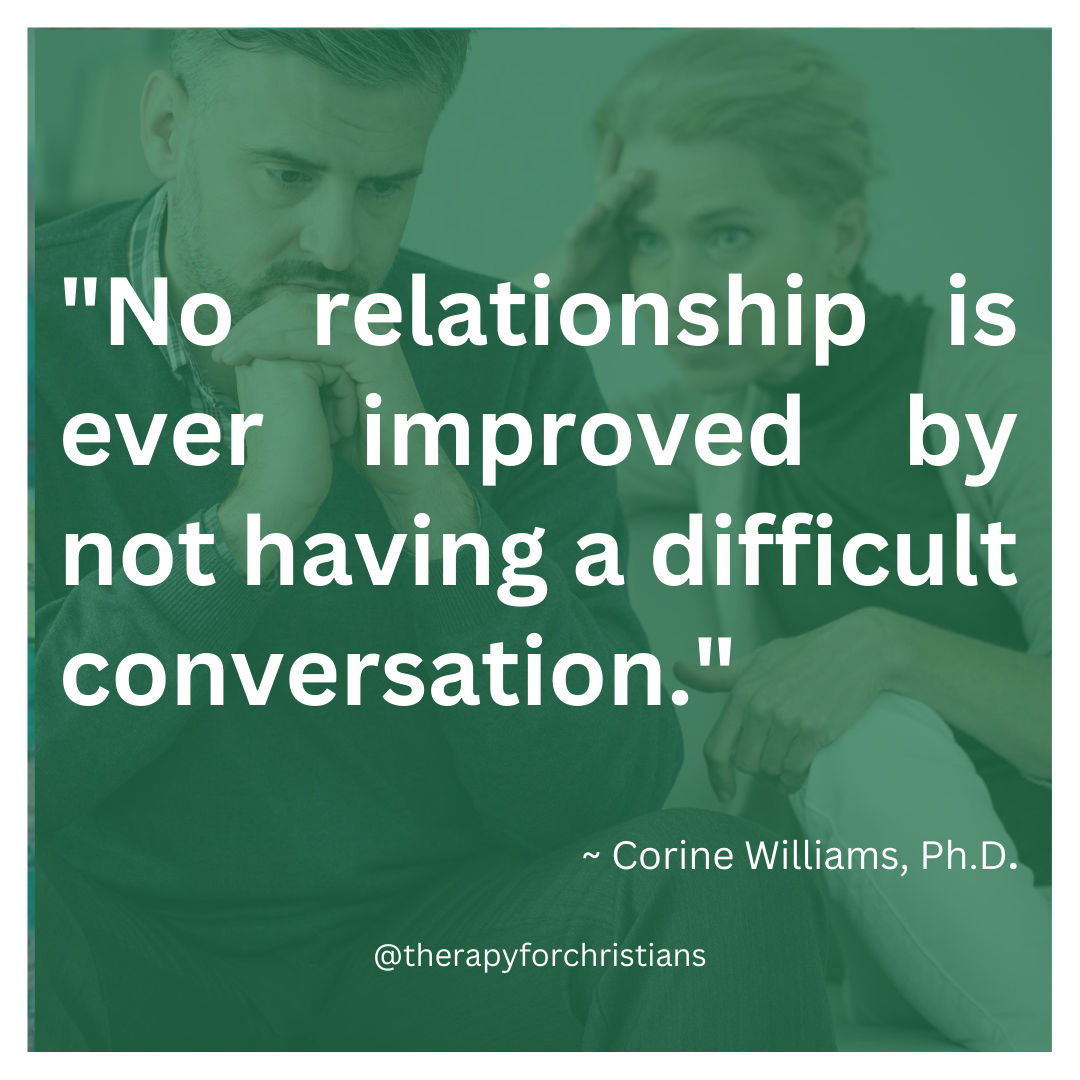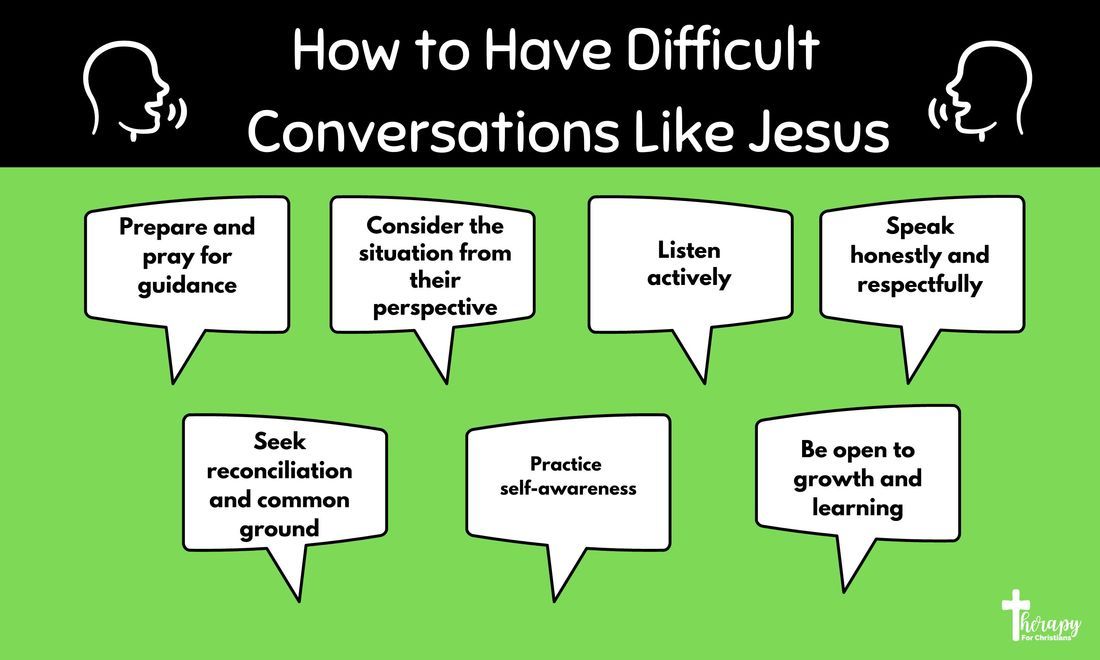
Difficult conversations are an inevitable part of life, and as Christians, we are called to navigate these tough talks like Jesus did, with grace, compassion, and love. In our life journey, we will definitely, without a doubt, encounter situations where we must address conflicts, share our concerns, or express our feelings honestly. And while it may be challenging and uncomfortable, engaging in these tough conversations is essential to living an authentic and fulfilled life.
Jesus demonstrated empathy and compassion in His interactions with Like this content on Facebook others, He knew how to tackle hard conversations with grace and love. So when faced with a tough conversation in our own lives, we can draw inspiration from His teachings and approach the situation with a heart of love, seeking to understand the other person's perspective.
Like this content on Facebook others, He knew how to tackle hard conversations with grace and love. So when faced with a tough conversation in our own lives, we can draw inspiration from His teachings and approach the situation with a heart of love, seeking to understand the other person's perspective.
There are many reasons to handle challenging conversations well, as well as many ways to do so. And that is what we'll be discussing in this blog. So if you're ready to learn how to have difficult conversations and find common ground, keep reading.
Why is it So Hard to Have Difficult Conversations?
As Christians, we are called to love our neighbors as ourselves and treat others with kindness. Therefore, fear of hurting the feelings of another person or damaging a relationship can make difficult conversations daunting. However, avoiding these tough conversations altogether does not align with our faith principles of honesty and transparency. We need to remember that Jesus Himself engaged in difficult conversations to bring about healing, reconciliation, and forgiveness.
One Scripture that reminds us of the importance of difficult conversations is Proverbs 27:5-6, which says, "Better is open rebuke than hidden love. Wounds from a friend can be trusted, but an enemy multiplies kisses." This verse highlights the value of speaking the truth in love, even if it may cause temporary discomfort. Engaging in difficult conversations with honesty and love can lead to stronger and more authentic relationships.
Related: Christian Marriage Communication Tips
How do You Start a Difficult Conversation?
Before starting a difficult conversation, it is important to seek guidance from God through prayer. Ask for wisdom, discernment, and a heart of love and compassion within your talk. Choose an appropriate time and place to have the conversation with the other person, ensuring privacy and little to no distractions.
Begin with a prayer, inviting the Holy Spirit to guide the conversation and soften the hearts of both parties. James 1:5, says, "If any of you lacks wisdom, you should ask God, who gives generously to all without finding fault, and it will be given to you." By seeking God's wisdom before starting a tough conversation, you can approach the situation with humility and rely on His guidance.
When starting the conversation, express your genuine concern and care for your conversation partner. Use "I" statements to share your thoughts and feelings, taking responsibility for your emotions without placing blame. Be open and transparent with your point of view, acknowledging your vulnerabilities and inviting the other person to do the same..jpg)
What Not to Say in a Difficult Conversation?
1 Peter 3:15 calls us to speak with gentleness and respect. Therefore, in challenging conversations, we must avoid using harsh or hurtful words, and refrain from criticizing or judging the other person. Instead of pointing fingers, focus on understanding their perspective and listening to their experiences without interrupting. Be mindful of your tone and body language, ensuring that you convey love and empathy throughout the conversation.
Ephesians 4:29 reminds us, "Do not let any unwholesome talk come out of your mouths, but only what is helpful for building others up according to their needs, that it may benefit those who listen." This verse serves as a reminder to speak words that build up and encourage, even in difficult conversations.
Related: How to Use Conversation Starter Cards to Learn More About Your Kids
7 Tips On Having a Successful Difficult Conversation

Having difficult conversations is a common challenge that everyone faces at some point in their lives. Whether it's addressing conflicts with friends, family, or colleagues, navigating these conversations with empathy and understanding can lead to positive outcomes and stronger relationships. Here are 7 tips on how to have successful difficult conversations while honoring our faith and strengthening our relationships.
Prepare and pray for guidance:
Before starting the conversation, take time to prepare yourself mentally and emotionally. Reflect on the purpose of the conversation and what you hope to achieve. Take a moment to pray for guidance and wisdom. Setting the intention to approach the conversation with empathy and understanding can create a more positive and constructive atmosphere. This, in turn, will ensure a more productive conversation.
Consider the situation from their perspective:
As Christians, you are called to love your neighbors as yourself (Matthew 22:39). This means that you should be willing to put yourself in their shoes and see things from their perspective, even if you don't agree with them.
When you are having a hard conversation, it can be easy to get caught up in your own feelings and perspectives. You may be thinking about how you are being wronged or how you want to defend yourself. However, if you want to have a productive conversation, you need to set aside your own feelings and focus on the other person.
We can do this by asking ourselves the following questions:
How does the other person feel about this situation?
What are their concerns?
What are they hoping to achieve by having this conversation?
Once you have a better understanding of the other person's perspective, you can start to have a more empathetic conversation. You can listen to them with an open heart and try to see things from their point of view. You can also share our own perspective, but in a way that is respectful and understanding.
Listen actively:
As a Christian, you are called to listen to others with the ears of Jesus. This means listening carefully and trying to understand other person's truth. As needed, ask questions and pay attention to their responses. This shows that you are interested in what the other person has to say and that you want to understand their point of view. You should also avoid interrupting and allow the other person to finish their thought before you respond.
Here are some additional tips for listening actively:
Make a conscious effort not to consider your response while the other person is speaking.
Be mindful of your own biases and prejudices. Try to listen with curiosity and without judgment.
Remember that the other person is a child of God. Treat them with respect and compassion.
Be willing to forgive the other person if they say something that hurts you.
Be open to learning from the other person. They may have something to teach you.
Active listening skills take practice and a Christian counselor or life coach can help. But it is a skill that is essential for building strong relationships and resolving conflict. If you can learn to listen to others with the ears of Jesus, you will be better able to love your neighbors as yourself and build the kingdom of God.
Speak honestly and respectfully:
Share your thoughts and concerns honestly but with kindness and respect, avoiding conflict. Be mindful of your tone and language, as well as the impact of your words on the other person. Focus on using "I" statements to express your feelings and avoid placing blame. This approach can promote open communication and mutual understanding.
Seek reconciliation and common ground:
Strive for the ideal outcome with the other person, which may include deciding to brainstorm solutions together. Look for areas of agreement and shared values, and use them as a foundation for understanding each other better. Seek reconciliation and conflict resolution rather than escalating the conflict.
Practice self-awareness:
Before and during the conversation, be aware of your own emotions and reactions. Recognize any emotional triggers that may affect your ability to stay calm and focused. Being more self-aware can help you manage your emotions and engage in these conversations more effectively.
Be open to growth and learning:
Difficult conversations can be opportunities for personal growth and learning. Be open to gaining new perspectives and insights from the other person. Embrace the opportunity to challenge your own beliefs and assumptions, even if it feels uncomfortable. By approaching difficult conversations with an attitude of openness and willingness to learn, you can foster good relationships with others while gaining better knowledge of communication strategies.

What to Do After a Difficult Conversation
After a tough talk, take time to reflect on the outcomes and pray for God's guidance moving forward. Consider what you learned from the conversation and what you might do differently in the future. Taking time to reflect on your own feelings can help you gain insights and grow from the experience.If the conversation led to reconciliation, thank God for His work in bringing about healing and restoration.
If the conversation had negative outcomes continue to pray for wisdom and seek God's direction on how to proceed. Romans 12:18 encourages us, "If it is possible, as far as it depends on you, live at peace with everyone." This verse reminds us that we are called to pursue peace and reconciliation, even if it requires ongoing effort and prayer.
Final Thoughts on Having a Difficult Conversation
As Christians, we are called to be peacemakers and ambassadors of Christ's love. Difficult conversations provide opportunities to demonstrate Christ-like qualities of humility, forgiveness, and understanding. Embrace these conversations with faith and trust in God's plan for reconciliation and healing.
Choose to avoid conflict and engage in productive and respectful conversations that lead to mutual understanding and growth in our faith and relationships. With confidence in God's guidance, you can tackle difficult conversations with a commitment to finding positive resolutions.
May your communication be filled with love and grace, reflecting the teachings of Jesus Christ in all aspects of your life. As you navigate difficult conversations, remember the words of Colossians 4:6, "Let your conversation be always full of grace, seasoned with salt, so that you may know how to answer everyone." With grace and love, you can describe difficult conversations as opportunities for growth instead of conflict.
Before you leave, we would appreciate it if you helped us spread the word by sharing, tweeting, pinning, etc. this post.
About the Author:
 Corine Williams, Ph.D. is Clinical Psychologist that is currently seeing clients in the States of Maryland, New Jersey, and New York. You can find out more about her practice by visiting www.therapyforchristians.com/corinewilliams. In addition to providing individual therapy, Dr. Williams is also passionate about writing books and designing merchandise that educate, uplift, and normalize mental health subject in the Christian community. You can find out more about her at www.booksbycorine.com or by visiting her amazon profile here: https://www.amazon.com/Corine-Hyman/e/B00AWZ5FL2
Corine Williams, Ph.D. is Clinical Psychologist that is currently seeing clients in the States of Maryland, New Jersey, and New York. You can find out more about her practice by visiting www.therapyforchristians.com/corinewilliams. In addition to providing individual therapy, Dr. Williams is also passionate about writing books and designing merchandise that educate, uplift, and normalize mental health subject in the Christian community. You can find out more about her at www.booksbycorine.com or by visiting her amazon profile here: https://www.amazon.com/Corine-Hyman/e/B00AWZ5FL2
Help us increase mental health awareness in the Christian community by donating through our paypal link here: www.paypal.com/therapyforchristians, joining our mailing list by clicking below, or join our provider list here: Provider listing
Disclaimer: the information, including but not limited to, text, graphics, images and other material contained on this article are for informational purposes only. No material on this site is intended to be a substitute for professional medical advice, diagnosis or treatment. If you are looking for a Christian counselor near you, please check out our directory located here: Christians Therapist Near Me
.png)

)-(3).jpg)









